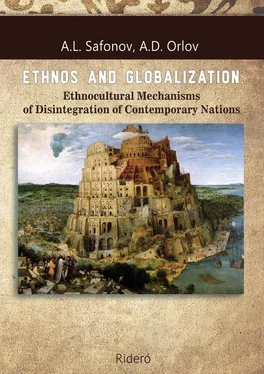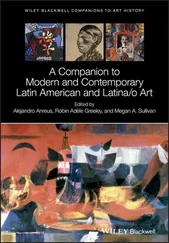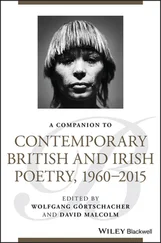In general, globalization as a systemic social phenomenon has a non-economic character. In light of this fact, it may only be adequately understood within the framework of a sociophilosophical and sociohistorical discourse.
As for economic globalization, its role lies in forming a global social milieu as the field for the development and intense interaction of phenomena of a social nature.
1.3. Ethnocultural aspects of globalization
The most important aspect of the sociodynamics of globalization processes is the correspondence of divergent and convergent aspects of social development. The dominant view of globalization as a unidirectional and all-encompassing process of unification and convergence follows from the economic determinism dominant in the scientific community. For example, it is accepted that social groups and communities, somewhat meaningful within the contemporary historical process, are almost exclusively formed by economic interests and relations. Nations and national (local) and global elites are usually considered such historically important groups. As for ethnos and ethnicity, actual ethnicity and ethnic identity are being accepted almost exclusively as belonging to isolated marginal ethnoses, adhering to a traditional lifestyle.
At the same time, the ethnic identity of members of political nations is either completely denied or admitted only as part of a sociohistorical phantom, a historical relic. It is significant that constructivism, as one of the leading movements of the theory of sociogenesis, denies the inseparable evolutionary character of cultural continuity, considering the contemporary flare-up of ethnic consciousness as a result of purposeful political propaganda in the interests of marginalized elites. Admitting, albeit under pressure, the consistent maintenance of ethnicism and ethnic identity beyond archaic communities, constructivism denies the existence of the modern ethnos as a real social community. 163 163 Tishkov, V. А. Ethnos or ethnicity? // Ethnology and Politics. Scientific Journal. M.: Nauka, 2001. – 240 p.
Globalization is considered to lead to crisis and the extinction of civil nations and nation states, which lose their economic essence by transforming relatively closed-off national economies into open social and economic systems. Based on that, one may come to seemingly logical conclusions about the inevitability and global character of convergent development engendering a certain global “suprasociety’ in which national, cultural and religious differences are being relegated to marginalized subcultures and will, in the foreseeable future, be completely eroded.
Correspondingly, within this approach, state nations, great powers and their blocs – and, since the second half of the twentieth century, transnational corporations – have been considered as actors in the global process. Globalization of national media markets and then educational systems, with global digital space as the technical basis, is the most important tool of ethnocultural convergence.
Therefore, from the point of view of economic determinism, the globalization of markets and the flows of goods, money, information and migration lead to the convergence and unification of humankind, the erosion of cultural and civilizational borders, and the formation of a new global identity without any alternative as a product of a global melting pot.
However, processes of real globalization, contrary to the logic of economic determinism, suddenly moved toward ethnic, civilizational and confessional divergence.
In this context, we may see the increasing contradiction of economic determinism as a dominant theoretical approach and the reality of globalization.
In 1991, following the triumphant actualization of the Western scenario of the convergence of two global systems, the actual process of globalization – despite the destruction of economic and political borders forming local social communities – moved towards ethnic and confessional divergence. That is why none of the theories of ethno- or national genesis that appeared in the twentieth century can sufficiently explain the post-industrial increase in ethnic and religious feelings.
The long foretold crisis of civil nations became not the synthesis of global supranational and supra-ethnic unity, but the fragmentation of post-industrial nations into ethnic and confessional groups.
Despite expectations, melting pots on the regional and global local level did not lead to the creation of a homogenous society with a common identity.
An example of an unexpected crash of the melting pot theory in the course of globalization is the United States itself, where the term “melting pot’ appeared as an idea of a polyethnic, multicultural and multiconfessional immigrant nation. Strictly speaking, the US melting pot has not been functional since the migration wave of the end of the nineteenth century. Since the second half of the nineteenth century, the US society has been made up of a range of ethnic communities (Italian, Irish, Chinese, African-American) steadily maintaining their identity in an urban social environment.
Ethnocultural fragmentation of US society not only persists but is increasing, despite the higher mobility of the workforce than in Europe. Notably, at the end of the 1960s, the United States was forced to abandon the melting pot model and turn to multiculturalism under the pressure of several ethnocultural minorities, especially African-Americans.
According to Lozansky 164 164 Lozansky, E. D. Ethnoses and Lobbyism in the USA. On Prospects of the Russian Lobby in America. M.: Mezhdunarodnye otnosheniya, 2004. – 272 p.
, author of the monograph “Ethnoses and lobbyism in the United States’, ethnic minorities and diasporas in the United States are becoming more and more separated, creating within the bodies of power all the more powerful lobbies compared to the corporate lobby (of transnational corporations), and even a party system. At the same time, ethnic lobbies in the United States purposefully lobby the interests of the states from which they came: diasporas within themselves not only turn into diasporas for themselves, but are becoming the tools for ethnic metropolises to influence states admitting migrants.
Orientation of the United States toward the formation not of a single alloy in the ‘furnace’ of many nationalities, but toward forming of a motley multi-faceted multiculturalism led to logic results, a strengthening of positions of ethnic minorities. 165 165 Lozansky, E. D. Ethnoses and Lobbyism in the USA. On Prospects of the Russian Lobby in America. M.: Mezhdunarodnye otnosheniya, 2004. – 272 p.
To prove his theory, Lozansky emphasizes that other US authors are worried about the threat of ethno-confessional fragmentation of the American nation, up to the possibility of Balkanization.
In particular, Huntington remarks on the increasing influence of civilizations in global politics and the stability of the links between immigrants and their countries of origin, believing that the basis for unity in the United States and the USSR is ideology, not a single national culture. 166 166 Huntington, S. The erosion of American national interests // Foreign Affairs. – 1997. – Sept Oct – P. 35.
This points to the fact that the role of ethnic cultures and ethnic communities remains rather important. State ideology plays a vital part in the integration of society in this case.
The United States is a leading power hub in the contemporary world order and may be seen as an accurate enough model of the global post-industrialized society. Hence it follows that the increasing role of ethnicity seen everywhere in the world, the ethnicization of politics and the conversion of diasporas into agents of local and global politics, is not a chance paradox but one of the key attributive characteristics of globalization.
Читать дальше












